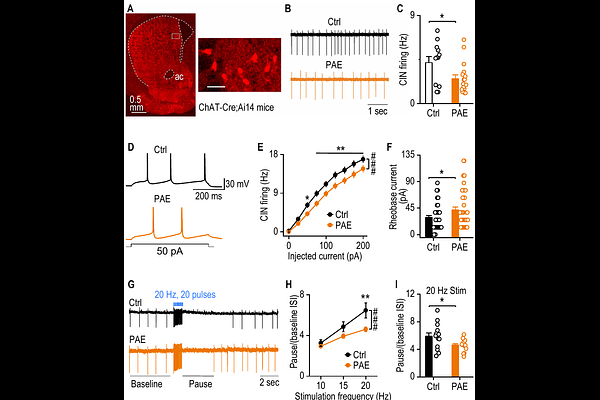Prenatal Alcohol Exposure Impairs Striatal Cholinergic Function and Cognitive Flexibility in Adult Offspring

Prenatal Alcohol Exposure Impairs Striatal Cholinergic Function and Cognitive Flexibility in Adult Offspring
Purvines, W.; Gangal, H.; Xie, X.; Ramos, J.; Wang, X.; Miranda, R.; Wang, J.
AbstractFetal Alcohol Spectrum Disorder (FASD), caused by prenatal alcohol exposure (PAE), is characterized by significant cognitive impairments, including reduced cognitive flexibility. Despite the critical role of cholinergic interneurons (CINs) in the dorsomedial striatum (DMS) for cognitive and behavioral flexibility, their contribution to neurobehavioral deficits in FASD remains unclear. To address this gap, this research explored the impact of PAE on CIN populations and activity, cognitive flexibility, and compulsive drinking behaviors in adult offspring. Using ChAT-Cre;Ai14-tdTomato mice combined with ChAT staining, we found substantial reductions in CIN number within the striatum of adult PAE offspring. Functional assessments revealed that PAE markedly decreased CIN firing activity and reduced acetylcholine (ACh) release in the DMS, as measured by electrophysiology recordings and live-tissue confocal imaging using a genetically encoded ACh sensor. Behaviorally, PAE-exposed offspring exhibited a significant deficit in adapting to reversed action-outcome contingencies despite intact initial learning capabilities. Moreover, PAE-exposed mice exhibited compulsive alcohol drinking behavior, characterized by elevated consumption and preference for quinine-adulterated alcohol. These findings collectively highlight the critical role of impaired cholinergic signaling in the cognitive and behavioral deficits observed following PAE. Understanding this cholinergic dysfunction provides valuable insights necessary for developing targeted interventions aimed at mitigating cognitive and behavioral consequences associated with FASD.